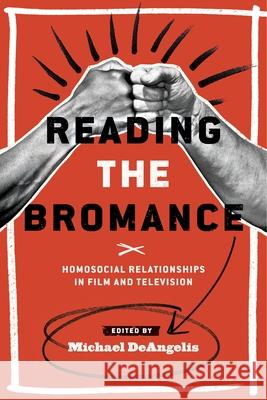Reading the Bromance: Homosocial Relationships in Film and Television » książka
Reading the Bromance: Homosocial Relationships in Film and Television
ISBN-13: 9780814338988 / Angielski / Miękka / 2014 / 318 str.
In the middle of this century's first decade, "bromance" emerged as a term denoting an emotionally intense bond between straight men. Yet bromance requires an expression of intimacy that always toys with being coded as something other than "straight" male behavior, even as it insists that such intimacy must never be misinterpreted. In Reading the Bromance: Homosocial Relationships in Film and Television, editor Michael DeAngelis has compiled a diverse group of essays that address the rise of this tricky phenomenon and explore the social and cultural functions it serves.
Contributors consider selected contemporary film and television texts, as well as the genres that historically inspired them, in order to explore what needs bromance attempts to fulfill in relationships between men--straight or otherwise. Essays analyze films ranging from I Love You, Man to Superbad, Humpday, I Now Pronounce You Chuck and Larry, The Hangover, and the Jackass films, and include studies of representative examples in international cinema such as Y tu mama tambien and classic and contemporary films of the Bollywood genre. The volume also examines the increasingly prevalent appearance of the bromance phenomenon in television narratives, from the "male bonding" rituals of Friends and Seinfeld to more recent manifestations in House, The Wire, and the MTV reality series Bromance.
From historical analysis to discourse analysis, sociological analysis, and queer theory, this volume provides a broad range of methodological and theoretical approaches to the phenomenon in the first booklength study of the bromance genre. Film and television scholars as well as readers interested in pop culture and queer studies will enjoy the insights of Reading the Bromance.
In the middle of this century’s first decade, “bromance” emerged as a term denoting an emotionally intense bond between straight men. Yet bromance requires an expression of intimacy that always toys with being coded as something other than “straight” male behavior, even as it insists that such intimacy must never be misinterpreted. In Reading the Bromance: Homosocial Relationships in Film and Television, editor Michael DeAngelis has compiled a diverse group of essays that address the rise of this tricky phenomenon and explore the social and cultural functions it serves.
Contributors consider selected contemporary film and television texts, as well as the genres that historically inspired them, in order to explore what needs bromance attempts to fulfill in relationships between men—straight or otherwise. Essays analyze films ranging from I Love You, Man to Superbad, Humpday, I Now Pronounce You Chuck and Larry, The Hangover, and the Jackass films, and include studies of representative examples in international cinema such as Y tu mama tambien and classic and contemporary films of the Bollywood genre. The volume also examines the increasingly prevalent appearance of the bromance phenomenon in television narratives, from the “male bonding” rituals of Friends and Seinfeld to more recent manifestations in House, The Wire, and the MTV reality series Bromance.
From historical analysis to discourse analysis, sociological analysis, and queer theory, this volume provides a broad range of methodological and theoretical approaches to the phenomenon in the first booklength study of the bromance genre. Film and television scholars as well as readers interested in pop culture and queer studies will enjoy the insights of Reading the Bromance.











